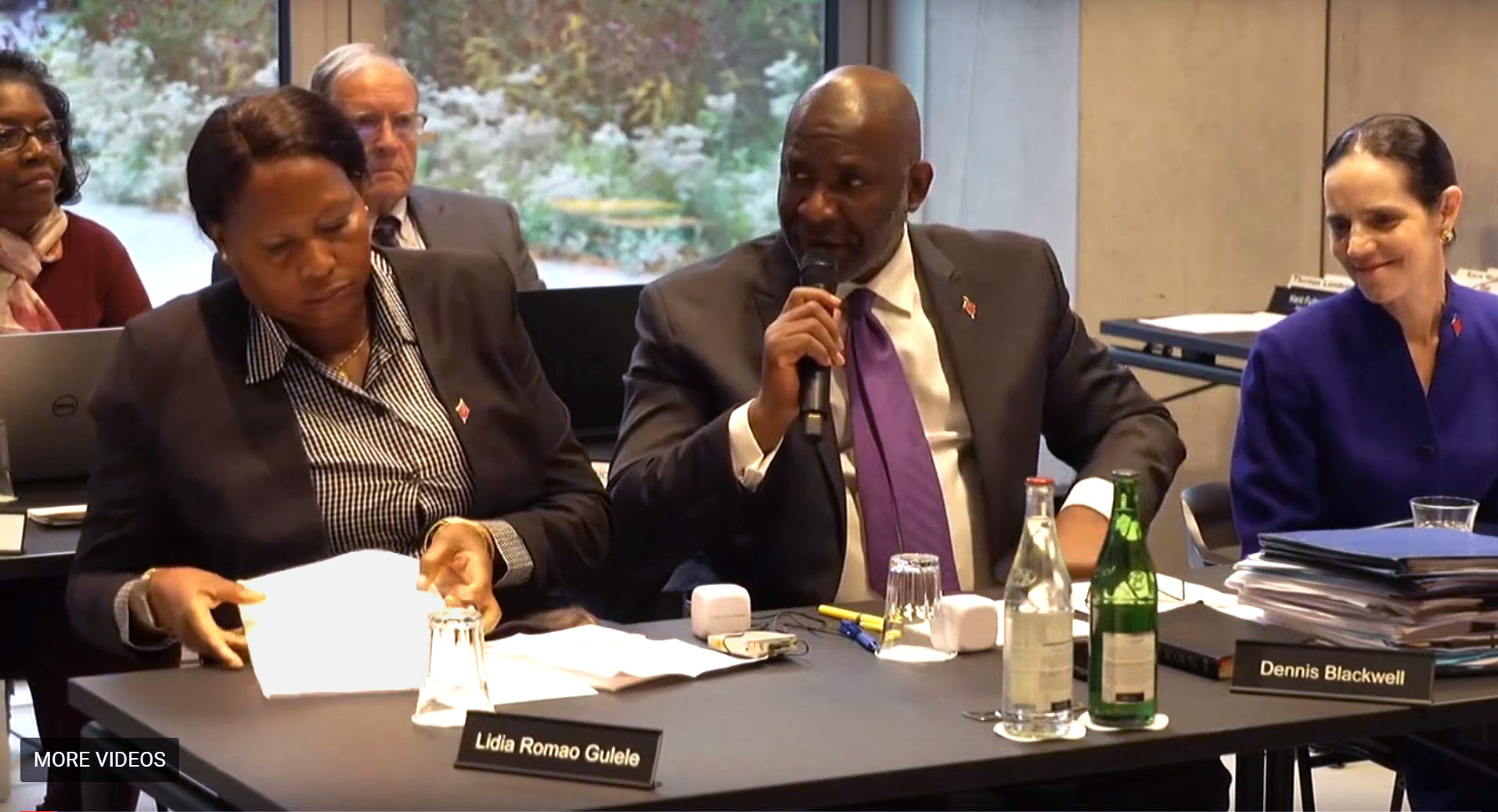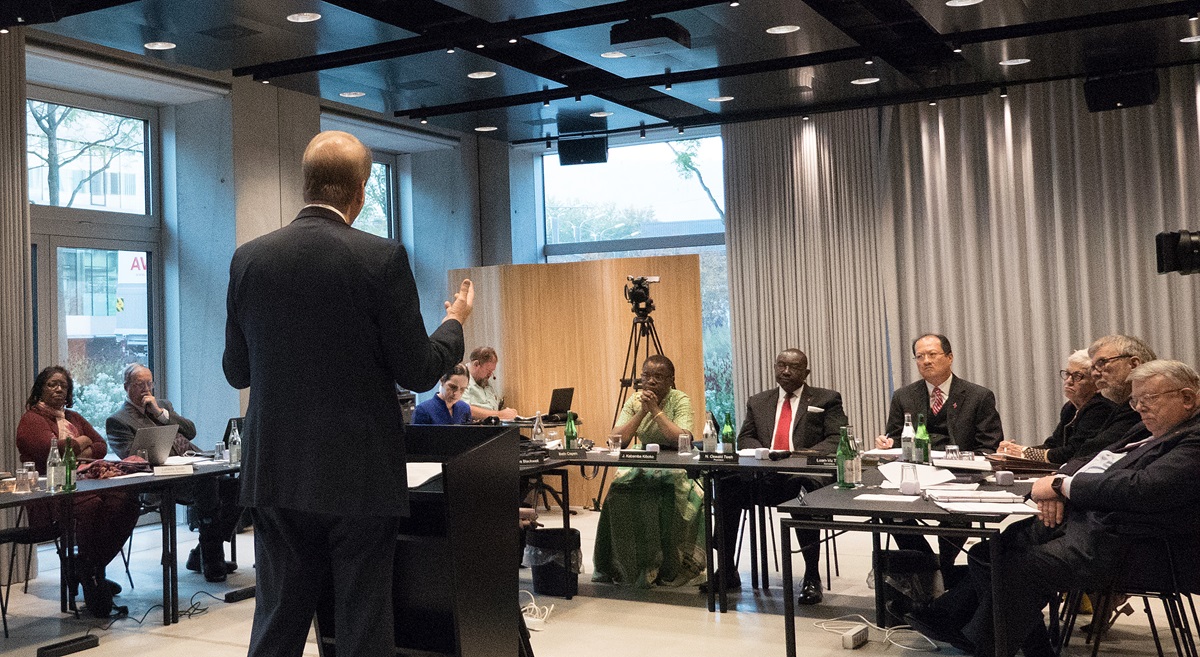The United Methodist Church’s top court has clarified what parts of legislation heading to the 2019 General Conference pass constitutional muster.
Now it’s up to plan supporters to decide how they will respond to the Judicial Council’s ruling.
“Whether a piece of proposed legislation is a good idea or not, that’s outside the purview of the Judicial Council,” said the Rev. William B. Lawrence, former Judicial Council president and one of the United Methodists who filed a brief in the case.
“The Judicial Council is only authorized to rule on if something is constitutional as proposed legislation.”
Put another way, the church court did not endorse any proposed legislation but instead ruled on whether the denomination’s constitution allows General Conference to enact such legislation in the first place.
The Council of Bishops asked the Judicial Council to rule on the constitutionality of the three plans contained in the Commission on Way Forward report — the One Church, Traditional and Connectional Conference models. The bishops appointed the commission to find ways for the denomination to stay united amid strong differences around homosexuality. The three plans all offer different directions for the denomination.
Next February, a special General Conference in St. Louis will consider the proposals as well as any other petitions deemed “in harmony” with the call for the special session.
In Decision 1366, which was unanimous, the church court found most of the One Church Plan constitutional. The court identified more constitutional problems with petitions in the Traditional Plan.
Because the Connectional Conference Plan already includes eight proposed constitutional amendments, the Judicial Council ruled that the plan fell outside its jurisdiction.
General Conference delegates who support the One Church and Traditional plans will have to decide whether they want to simply delete the parts deemed unconstitutional, transform those parts into potential constitutional amendments, or go in an entirely different direction.
Ratifying an amendment to the denomination’s constitution requires at least a two-thirds majority vote at General Conference followed by at least two-thirds total votes at annual conferences around the globe.
The deadline for submitting petitions has passed, which means any changes to submitted legislation will need to take place at the General Conference meeting. Delegates can propose amending legislation on the floor or ask fellow delegates to consider substitute legislation.
The Book of Discipline, the denomination’s policy book, currently bans “self-avowed practicing” gay clergy and officiating at same-gender unions. The One Church Plan would leave questions of ordination up to annual conferences and weddings up to local churches and individual clergy.
Judicial Council found the 17 petitions in the One Church Plan to be constitutional, except for one individual sentence each in Petitions 4, 8 and 13.
To learn more

- Judicial Council Decision 1366
- Read about oral arguments in the case
- Commission on Way Forward report in English, Portuguese, French and Swahili
Supporters were looking forward, now that the Judicial Council has ruled.
“I think our game plan is in place,” said the Rev. Mark Holland, a delegate from the Great Plains Conference who started the unofficial group Mainstream UMC to advocate for the One Church Plan. He joined with other One Church Plan supporters to file a brief in the case.
Holland said none of the sentences ruled unconstitutional is critical. He hopes the denomination’s bishops, a majority of whom support the One Church Plan, will recommend the adjustments needed so the plan could pass without constitutional amendments. Bishops don’t have a vote at General Conference.
The Rev. Tom Berlin, a Way Forward Commission member who championed the One Church Plan before the Judicial Council, was heartened by the court’s decision.
“The unanimous Judicial Council established that Wesleyan connectionalism does not require strict uniformity on all issues,” said Berlin, who is also a delegate from the Virginia Conference.
“This is a plan that can deliver what it promises, providing unity to our diverse denomination in the various countries and continents in which it exists,” he added.
Thomas Starnes, Baltimore-Washington Conference chancellor and a One Church Plan supporter who filed briefs and made oral arguments in the case, thanked the court.
“The One Church Plan faced a barrage of attacks, but the Judicial Council upheld the constitutionality of the legislation’s core provisions,” he said.
The Traditional Plan seeks to enhance enforcement of current bans related to homosexuality, including imposing mandatory penalties on violations. However, the Judicial Council ruled that certain portions of the plan strayed from the constitution on matters of due process and by elevating adherence to requirements related to homosexuality above all other requirements.
Of the plan’s 17 petitions, the court ruled seven unconstitutional and identified unconstitutional portions in two others.
The Rev. Thomas Lambrecht, a Way Forward Commission member who spoke on behalf of the Traditional Plan at the Judicial Council, said he was disappointed in the ruling and plans to ask the court to reconsider at least part of the decision.
But he too is looking forward to the special General Conference.
“After studying the ruling, I believe that almost all the identified flaws can be corrected through amendments to the plan itself, which we will be preparing in the weeks ahead,” said Lambrecht, who is also a leader in the Renewal and Reform Coalition. The coalition encompasses unofficial advocacy groups that urge the denomination to hold the line on homosexuality teachings.
“Based on the ruling, it appears that the Council of Bishops accountability process will not be constitutional, so we will be focusing on perfecting the alternative accountability process for bishops that is in the Modified Traditional Plan,” Lambrecht said.
That legislation, submitted on behalf of the Renewal and Reform Coalition, creates a new global episcopacy committee to hold bishops and conferences accountable.
The Rev. Alexandre da Silva Souto, General Conference delegate from the New York Conference and a leader in the unofficial UM Queer Clergy Caucus, said The Judicial Council's ruling gave him hope. He praised the ruling for identifying what he sees as injustices in both the Traditional and One Church plans. However, he is hoping delegates give the Simple Plan a serious look. That plan, which he and other United Methodists submitted, eliminates all restrictions in the denomination’s Book of Discipline related to the practice of homosexuality.
"My prayer is that at General Conference we will choose a less harmful way forward, which I believe can be achieved through the Simple Plan," he said.
Lonnie Brooks, a reserve delegate from the Alaska Conference, filed a brief questioning parts of both the One Church and Traditional plans.
“While nothing is ever unsalvageable, the task of salvaging the (Traditional Plan) in the face of these rulings is a daunting task, indeed,” he said.
However, he noted that that the Judicial Council did uphold the constitutionality of a portion of the Traditional Plan that allows annual conferences to leave the denomination.
Traditional Plan backers also are looking to support an exit strategy for churches.
The Wesleyan Covenant Association, an unofficial traditionalist group of United Methodists that has not been shy about the possibility of breaking from the denomination, will hold its first global legislative assembly Nov. 2, at Mount Bethel United Methodist Church in Marietta, Georgia.
The group’s delegates will be asked to approve a handful of resolutions, including one that endorses fundamental features and principles of a new Methodist denomination and authorizes creation of a working group to “envision a revitalized Methodist movement within and/or outside” The United Methodist Church.
“We are committed to the adoption of the Traditional Plan and to the provision of a gracious exit path for churches and pastors who disagree with whatever decision is made by the special General Conference,” the Rev. Keith Boyette, president, wrote in the group’s newsletter.
Patricia Miller, a member of the Commission on a Way Forward, spoke on behalf of the Connectional Conference Plan at the Judicial Council. That plan restructures the denomination to include three values-based connectional conferences. Annual conferences would align with one of those, based on theology or perspective on LGBTQ ministry. She emphasized that the plan is still properly before General Conference voters.
Miller is executive director of the Confessing Movement, a group that’s part of the Renewal and Reform Coalition. Like Lambrecht, she also was disappointed in the Judicial Council’s ruling on the Traditional Plan. But she agreed it could be amended.
“The Confessing Movement will continue to work with the other Renewal and Reform Coalition members in support of the now-needed amendments and for passage of the Traditional Plan,” she said.
The Rev. George K. Weagba, a vice president at the United Methodist University of Liberia and General Conference delegate, also encouraged supporters of the Traditional Plan to “not give up” and noted the Commission on a Way Forward gave more attention to the other two plans.
Reconciling Ministries Network, an unofficial advocacy group that favors full equality for LGBTQ individuals in the church, issued a brief statement offering thanks for the council’s work in addressing the constitutionality questions.
The Council of Bishops expressed its gratitude as well. Bishop Kenneth H. Carter Jr., president of the council and Way Forward Commission moderator, quoted from the Commission on a Way Forward report in assessing the bishops’ role at this point.
“We continue to be guided by two core convictions,” he said in a statement. “We want to help the delegates to do their best work at the called General Conference, and we are seeking a way forward for the church that ‘maximizes the presence of the United Methodist witness in as many places in the world as possible, that allows for as much contextual differentiation as possible, with a desire for as much unity as possible.’”
Hahn and Hodges are writers for United Methodist News Service. Swen is a communicator in Liberia. Contact them at 615-742-5470 or newsdesk@umcom.org.
To read more United Methodist news, subscribe to the free Daily or Weekly Digests.
Like what you're reading? Support the ministry of UM News! Your support ensures the latest denominational news, dynamic stories and informative articles will continue to connect our global community. Make a tax-deductible donation at ResourceUMC.org/GiveUMCom.




